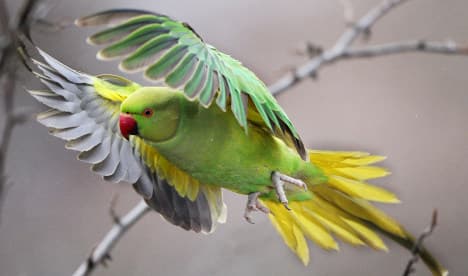Over 800 new species colonize Germany

Over 800 non-native plant and animal species have settled in Germany over the past few decades, while several species which disappeared long ago are returning home, according to the Federal Office for Nature Conservation (Bfn).
"Some of the species were brought in as a result of globalisation or were sometimes even released deliberately,” said Bfn President Beate Jessel this week. She also said climate change was pushing animals to move.
"The majority of the non-native species do not cause any problems and integrate excellently," said Jessel.
However, some new species which have made themselves at home in Germany, such as the raccoon and the parakeet, have been thriving so well that they prey on, and threaten, native species.
Others, such as the Pacific oyster, have been known to take the place of native species and push them out of their habitat.
Of the hundreds of new species, some were once native to Germany but died out.
Nationwide drives have seen some successfully reintroduced, including the European sturgeon, lynxes, beavers, and the non-venomous dice snake.
Another success story was the German sea eagle population - driven almost to the brink of extinction in the middle of the 20th Century - which now numbers around 700 breeding pairs, according to the Bfn.
Newcomers to Germany have migrated from neighbouring countries of their own accord in search of better living conditions, such as the golden jackal, a native of south-east Europe, which has now been sighted several times in Germany.
And Bfn said it expected more species to arrive as climate change continues.
"Through climate change we will get a whole load of new species which are actually used to drier and warmer conditions," said Jessel.
Meanwhile, native species such as the wolf which long ago all but disappeared from Germany have been steadily returning to the country, according to the study.
Bfn said the phenomenon is partly due to the success of environmental protection programmes which have made conditions more favourable for the species, but is also a result of climate change.
Other wildlife conservationist organisations reacted cautiously to the news that Germany's native species were making a comeback.
Populations of many species, among them an alarming number of birds, are declining due to intensive agriculture, said the Nature and Biodiversity Conservation Union (NABU) on Monday.
A group of just 120 wolves in the wild does not make a stable population, pointed out Till Hopf, conservation spokesman for NABU.
"With the wolves we're still in a test phase," said WWF spokesman Jörn Ehlers, "At some point there will be an incident. We have to prepare people for that."
DPA/DAPD/The Local/jlb
Comments
See Also
"Some of the species were brought in as a result of globalisation or were sometimes even released deliberately,” said Bfn President Beate Jessel this week. She also said climate change was pushing animals to move.
"The majority of the non-native species do not cause any problems and integrate excellently," said Jessel.
However, some new species which have made themselves at home in Germany, such as the raccoon and the parakeet, have been thriving so well that they prey on, and threaten, native species.
Others, such as the Pacific oyster, have been known to take the place of native species and push them out of their habitat.
Of the hundreds of new species, some were once native to Germany but died out.
Nationwide drives have seen some successfully reintroduced, including the European sturgeon, lynxes, beavers, and the non-venomous dice snake.
Another success story was the German sea eagle population - driven almost to the brink of extinction in the middle of the 20th Century - which now numbers around 700 breeding pairs, according to the Bfn.
Newcomers to Germany have migrated from neighbouring countries of their own accord in search of better living conditions, such as the golden jackal, a native of south-east Europe, which has now been sighted several times in Germany.
And Bfn said it expected more species to arrive as climate change continues.
"Through climate change we will get a whole load of new species which are actually used to drier and warmer conditions," said Jessel.
Meanwhile, native species such as the wolf which long ago all but disappeared from Germany have been steadily returning to the country, according to the study.
Bfn said the phenomenon is partly due to the success of environmental protection programmes which have made conditions more favourable for the species, but is also a result of climate change.
Other wildlife conservationist organisations reacted cautiously to the news that Germany's native species were making a comeback.
Populations of many species, among them an alarming number of birds, are declining due to intensive agriculture, said the Nature and Biodiversity Conservation Union (NABU) on Monday.
A group of just 120 wolves in the wild does not make a stable population, pointed out Till Hopf, conservation spokesman for NABU.
"With the wolves we're still in a test phase," said WWF spokesman Jörn Ehlers, "At some point there will be an incident. We have to prepare people for that."
DPA/DAPD/The Local/jlb
Join the conversation in our comments section below. Share your own views and experience and if you have a question or suggestion for our journalists then email us at [email protected].
Please keep comments civil, constructive and on topic – and make sure to read our terms of use before getting involved.
Please log in here to leave a comment.